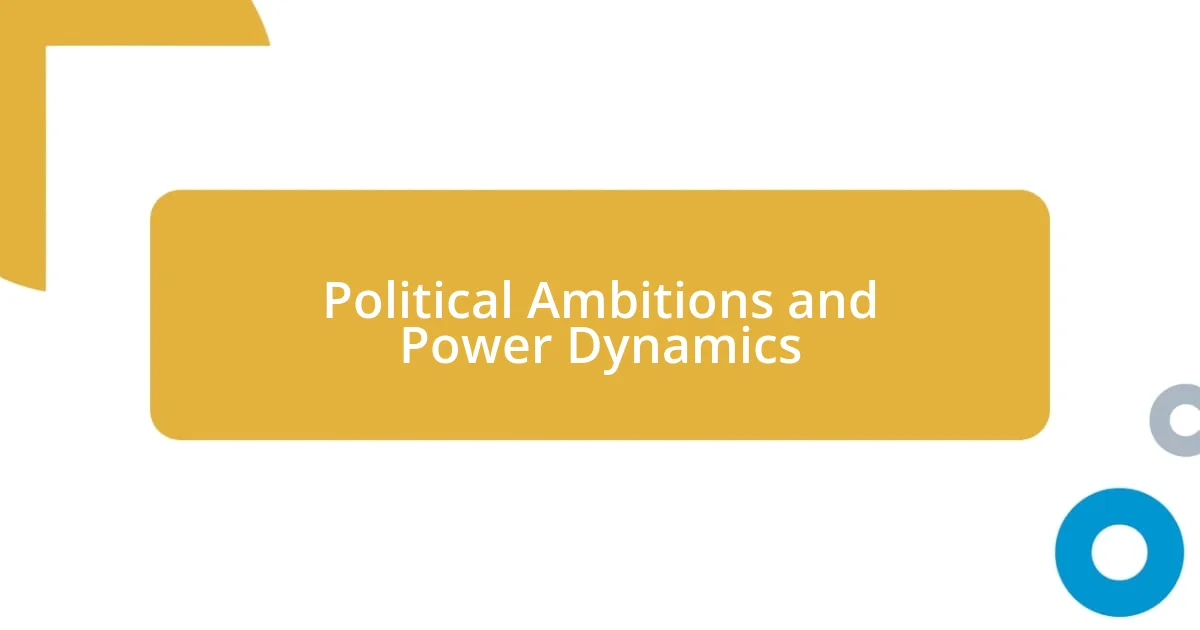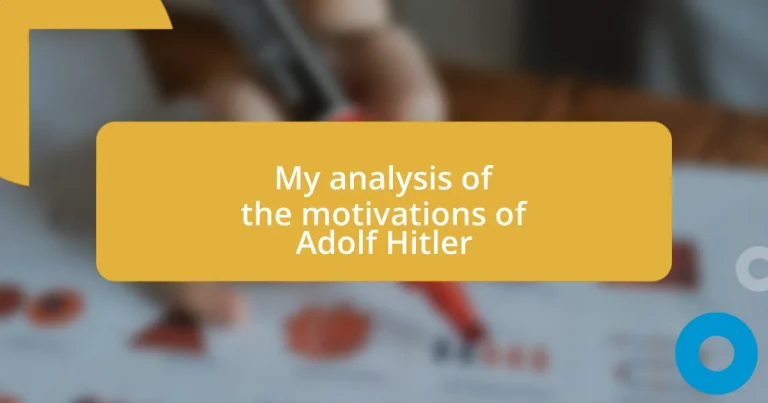Key takeaways:
- Hitler’s motivations stemmed from a blend of personal experiences, societal upheaval, and the emergence of radical ideologies after World War I, which created an environment ripe for his extreme beliefs.
- His formative experiences, including rejection as an artist and authoritarian family dynamics, amplified his desire for power and shaped his aggressive worldview.
- Hitler effectively utilized political theater and propaganda to manipulate public sentiment, framing opposition as existential threats, highlighting the dangers of divisive rhetoric in politics.

Introduction to Adolf Hitler’s Motivations
When exploring Adolf Hitler’s motivations, I often find myself contemplating the complex interplay of personal experiences and societal influences that shaped his worldview. Growing up in a tumultuous environment, it’s fascinating to consider how a boy from Austria could transform into a figure synonymous with darkness. It raises questions about the impact of early trauma and the desire for power, doesn’t it?
Hitler’s motivations were a mix of deep-seated beliefs, political aspirations, and a desire for identity and belonging. These motivations reveal not only a man driven by ambition but also someone who sought validation through an extreme vision for Germany. Think about it: what drives a person to seek transformation through destruction? It’s a sobering reflection on how one person’s fears and desires can ripple out to affect millions.
What stands out to me is the ideological framework Hitler constructed, which combined nationalism and anti-Semitism. This toxic blend became the foundation for his policies and actions. I often wonder, how did these ideas resonate so powerfully with a society eager for change? The exploration of such motivations leads us to understand not only Hitler as an individual but the broader implications of his beliefs on history and humanity.

Historical Context of Hitler’s Ideologies
The historical context of Hitler’s ideologies is crucial for understanding how they emerged and gained traction in Germany. Coming out of World War I, many Germans experienced profound humiliation and economic turmoil. I often think about how this national despair created fertile ground for radical ideas. Hitler tapped into these emotions, promising a return to greatness and offering a scapegoat for the frustrations of the populace.
Moreover, prevalent theories of social Darwinism and the notion of a “superior race” played a significant role in shaping Hitler’s ideology. These ideas were not unique to him but rather part of a larger dialogue in Europe at the time. I can’t help but reflect on how dangerous it is when pseudoscience intertwines with political power, leading to devastating consequences. It poses the question: how can societies ensure that history doesn’t repeat itself?
Lastly, the economic devastation of the Great Depression compounded the urgency for radical solutions. People were looking for quick fixes and strong leaders, creating an opening for Hitler’s promises of economic revival and national sovereignty. It strikes me as an unsettling reminder of how vulnerable populations can be swayed by charismatic figures during times of crisis. It’s a moment in history that should provoke thought about leadership and responsibility.
| Historical Context | Hitler’s Response |
|---|---|
| Post World War I Economic Crisis | Promised economic revitalization and national pride. |
| Emergence of Social Darwinism | Justified extreme nationalism and racist ideologies. |
| The Great Depression | Utilized despair to rally support for radical solutions. |

Personal Influences on Hitler’s Beliefs
Hitler’s beliefs were undeniably shaped by the personal experiences he encountered during his formative years. I’ve often pondered how the disappointment and rejection he faced, particularly in his attempts to become an artist, fueled a desire for recognition and power later in life. His tumultuous relationship with his father and the early loss of his mother could have instilled a sense of abandonment that drove him to seek validation on a grand scale.
- The rejection from art school in Vienna fostered a deep resentment towards the elites and intellectuals.
- His father’s authoritarian nature may have influenced his need for control and dominance in his future leadership style.
- Experiencing anti-Semitic sentiments in Austria likely planted the seeds for his later racist ideologies.
The intense emotional landscape of his youth played a paramount role in fortifying his aggressive worldview. I can’t help but feel that these personal struggles merged with the broader societal pain to create a potent cocktail of motivations. It’s a chilling reminder that personal bitterness can morph into a wider societal venom when left unchecked, ultimately leading to catastrophic consequences.

Political Ambitions and Power Dynamics
Hitler’s political ambitions were intricately tied to his unique ability to manipulate power dynamics. I often marvel at how he boldly positioned himself as the ultimate savior in the eyes of a desperate nation. By exploiting the fears and desires of the German people, he transcended mere political aspirations. Instead, he crafted a narrative where power was not just to be obtained, but a means to resurrect a perceived lost national identity. Doesn’t it make you wonder how a singular figure can resonate so deeply with an entire populace?
Additionally, his understanding of political theater played a crucial role in consolidating his power. I think back to those massive rallies, where he captivated crowds with fiery oratory. It’s astounding to realize how the spectacle of those events was a masterclass in emotional manipulation. Hitler wasn’t just seeking power; he was rewriting the rules of engagement in politics. Doesn’t it raise questions about our current political leaders and how they communicate their visions?
The use of propaganda to vilify opponents marked another strategic move in his quest for dominance. In my view, he effectively reframed opposition not just as ideological disagreements but as existential threats. I can’t help but feel a twinge of unease when I think about how easily any society can slip into such divisive rhetoric. It serves as a cautionary tale about the narratives we choose to believe and how they shape our political landscape.

Conclusions on Hitler’s Motivational Analysis
Analyzing Hitler’s motivations reveals a complex interplay of personal experiences and broader socio-political dynamics. I find myself reflecting on how the combination of his upbringing, with its inherent disappointments, and the societal upheavals of post-World War I Germany created a fertile ground for his destructive ideologies. It’s intriguing to think about how he harnessed personal discontent into a national cause, ultimately turning his internal struggles into a rallying point for millions.
His need for validation and dominance wasn’t just a personal endeavor; it became a nationalistic obsession that resonated deeply with an audience struggling to reclaim their identity. I often wonder how many leaders throughout history have tapped into similar vulnerabilities of their people to sway public opinion. It’s a powerful reminder of how personal motivations can manifest as collective movements, for better or worse.
As I wrap up my analysis, I can’t shake the feeling that understanding Hitler’s motives serves as a warning for today. The mechanisms he employed to gain power, from exploiting fears to vilifying opposition, can echo into our present political discourse. What lessons can we draw from his rise? One thing is clear: the intersection of personal pain and societal crisis can be perilously potent when paired with ambition.














